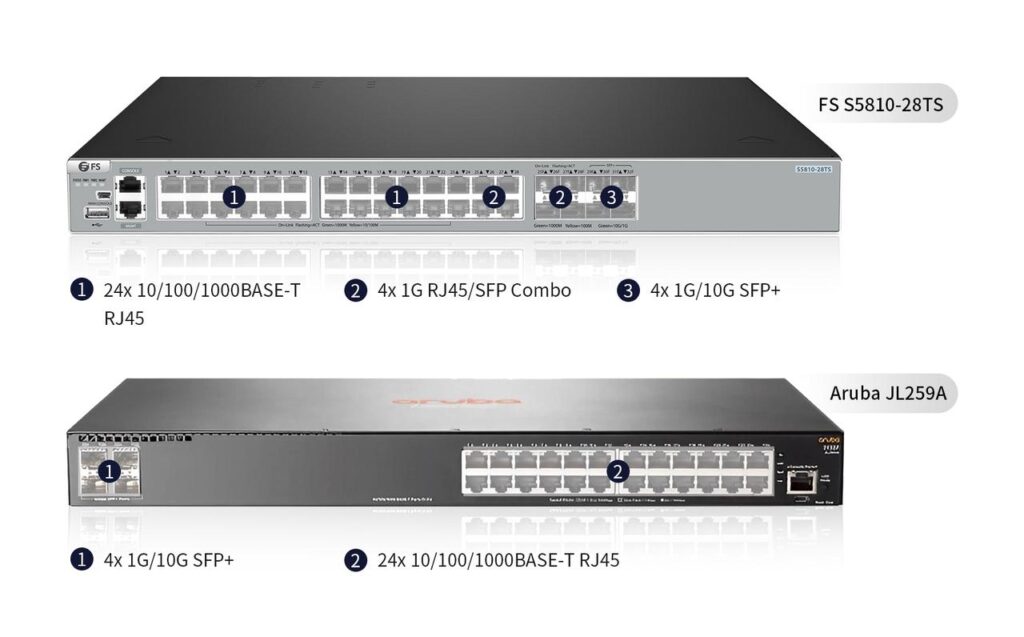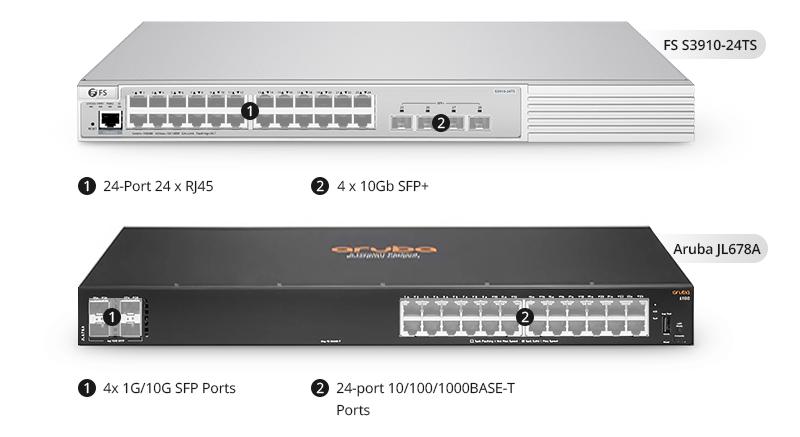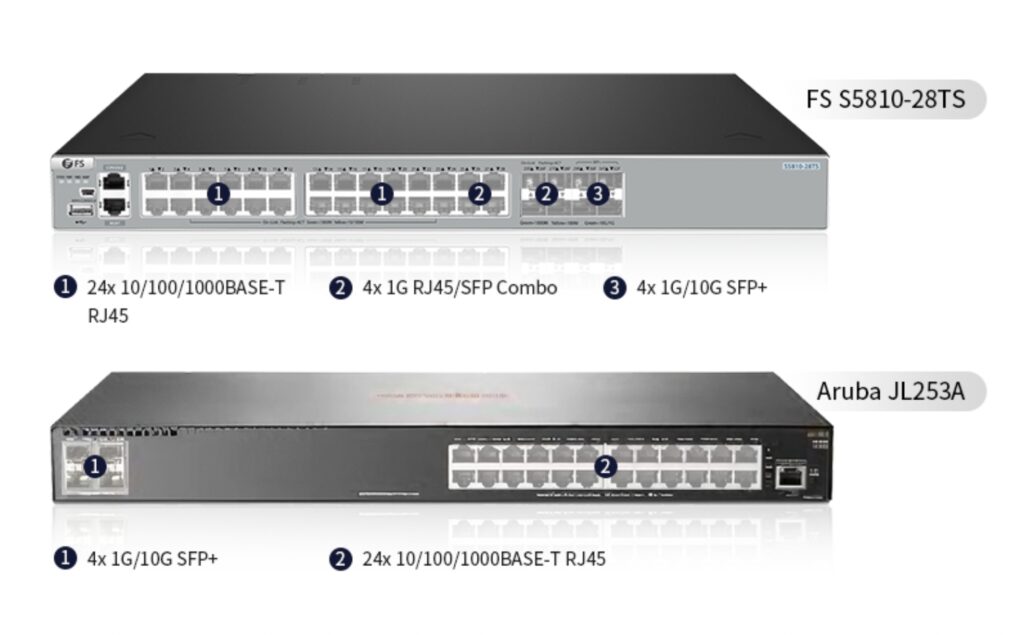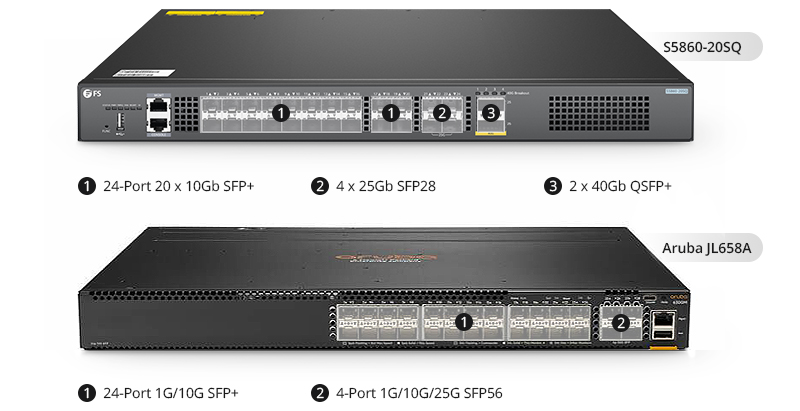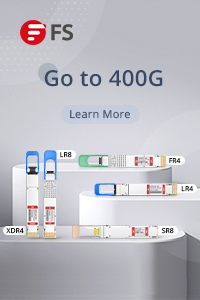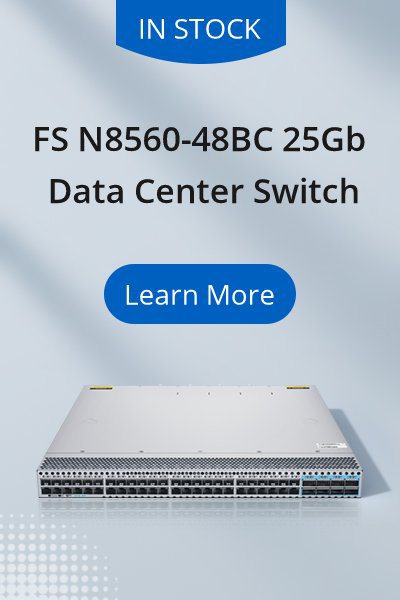In the ever-evolving world of networking equipment, making the right choice for your small business can be a daunting task. Two contenders in the Ethernet switch market are the FS S2805S-24TF-P and the Cisco CBS250-24FP-4G. Both switches offer impressive features tailored to meet the needs of small businesses. In this article, we will compare FS S2805S-24TF-P and Cisco CBS250-24FP-4G across various parameters to help you make an informed decision.
FS S2805S-24TF-P vs. Cisco CBS250-24FP-4G

Performance and Features
When it comes to performance, both FS S2805S-24TF-P and the Cisco CBS250-24FP-4G offer impressive capabilities. Both of them are equipped with 24x 10/100/1000BASE-T PoE+ ports and 4x 1G SFP uplink ports, offering flexibility to accommodate various types of connectivity options. In terms of features, both switches support advanced protocols and features like VLANs, QoS, and Link Aggregation Protocol. FS S2805S-24TF-P is also a fully featured L2 switch that comes with simple Web GUI management, greatly meeting the network demands of growing SMBs.
Scalability
Scalability is a crucial factor to consider when selecting a switch for your network. When it comes to scalability, both switches are capable of meeting the growing demands of your small business. With 24 ports each, they provide ample room for expansion. You can quickly expand your business’s network capacity to support powered devices such as IP security cameras, wireless access points, VoIP phones, etc.
Reliability and Redundancy
Network downtime can be costly for small businesses, so reliability and redundancy are crucial considerations. FS S2805S-24TF-P and Cisco CBS250-24FP-4G both offer reliable hardware with robust build quality. FS S2805S-24TF-P is packed with one power supply and 3 built-in fans for superior network reliability. It also supports non-stop upgrades, continuous forwarding, graceful restarting, and redundancy protection. On the other hand, Cisco CBS250-24FP-4G comes with 1 default power supply and a fanless design.
Management and Monitoring
Effective management and monitoring are essential for network optimization and troubleshooting. FS S2805S-24TF-P provides a user-friendly web-based management interface, which is intuitive and easy to navigate. It also supports SNMP, making it compatible with various network management tools. Likewise, Cisco CBS250-24FP-4G offers a robust web-based management interface with a comprehensive set of features.
Security
Network security is paramount, even for small businesses. FS S2805S-24TF-P comes equipped with features like MAC address filtering, port security, and IEEE 802.1X network access control to help safeguard your network. Cisco CBS250-24FP-4G, being a Cisco product, offers advanced security features, including Access Control Lists (ACLs), DHCP snooping, and IP Source Guard, providing enhanced protection for your network.
Cost
Cost is often a significant factor when making purchasing decisions. FS S2805S-24TF-P generally comes at a much more affordable price compared to Cisco CBS250-24FP-4G. This can be especially beneficial for small businesses with budget constraints or those looking for cost-effective solutions without compromising on essential features and performance. However, it’s essential to weigh the upfront cost against the long-term benefits and features that best align with your business requirements.
Support & Warranty
FS S2805S-24TF-P offers a 5-year limited warranty against defects in materials or workmanship. Most importantly, FS provides free professional technical support and 24/5 live customer service. You can always find tailored solutions and services for your businesses. Similarly, Cisco CBS250-24FP-4G comes with a limited lifetime warranty and complementary one-year access to Cisco’s Small Business Support Center for ongoing support. However, the level and extent of support may vary, and it’s important to review the specific terms and conditions of the warranty before making a decision.
FS S2805S-24TF-P vs. Cisco CBS250-24FP-4G at a Glance
Here is a table comparing the specifications of FS S2805S-24TF-P and Cisco CBS250-24FP-4G:
| Specification | FS S2805S-24TF-P | Cisco CBS250-24FP-4G |
| Ports | 48x 1G SFP, 6x 10Gb SFP+ Uplinks | 48x 1G SFP, Modular Uplinks |
| Switching Capacity | 56 Gbps | 56 Gbps |
| Forwarding Rate | 41.66 Mpps | 41.66 Mpps |
| Power Supply | 1 default power supply | 1 default power supply |
| Fan | 3 Built-in | Fanless |
| Power Budget | 370W | 370W |
| Cost | Varies | Varies |
Please note that the cost of these switches can vary depending on the retailer, region, and additional features or support options selected. It’s best to check with authorized vendors or the respective manufacturers for the most accurate and up-to-date pricing information.
Conclusion
Ultimately, the choice between FS S2805S-24TF-P and Cisco CBS250-24FP-4G depends on your specific network requirements, budget, and the level of support and warranty coverage you prioritize. If cost-effectiveness is a significant consideration for your small business, FS S2805S-24TF-P may be a suitable choice, offering competitive performance and essential features at a more affordable price. Conducting a thorough evaluation and consulting with networking professionals can help you make an informed decision that aligns with your needs and goals.

